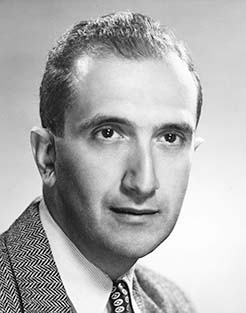Awards
- Honorary Degree - 1970
- D.S.
- Doctor of Science
- Commencement
- Bloomington, Indiana
- Presenter: Joseph Lee Sutton
- Nobel Prize - 1969
- Nobel Prize in Physiology or Medicine
- National Academies - 1964
- American Philosophical Society

In 1969 microbiologist Salvador Luria shared the Nobel Prize in Physiology or Medicine with Max Delbrïck and Alfred Hershey for their discoveries concerning the replication mechanism and the genetic structure of viruses. They were praised for setting the solid foundations on which modern molecular biology rests. Luria was able to carry out his award-winning research only after escaping first Fascism and then Nazism as World War II was engulfing Europe.
A native to Torino, Italy, Luria attended the University of Torino, earning an M.D. in 1935. In 1938 he received a fellowship to work with Max Delbrïck in the United States, but before he could travel to this country, the Fascist regime banned Jews from academic research. Luria moved to Paris, France in 1938, where he was a research fellow at the Institute of Radium. As Nazi armies invaded France in 1940, he fled by bicycle to Marseilles, where he received an immigration visa to the United States.
Physicist Enrico Fermi helped Luria secure a fellowship at Columbia University, and Luria soon met Delbrïck and Hershey and collaborated with them on experiments at Cold Spring Harbor Laboratory and at Delbrïck's Laboratory at Vanderbilt University. In 1943, Luria became a faculty member at Indiana University, where he remained until 1950, continuing his research on viruses that infect bacteria, known as phages. His first graduate student was James Watson, who just three years after earning his doctorate under Luria's direction would co-discover the structure of DNA with Francis Crick. Luria received an IU honorary doctor of science degree in 1970.
Luria joined the faculty at the University of Illinois at Urbana-Champaign in 1950, and in 1959, he became chair of microbiology at the Massachusetts Institute of Technology (MIT). He then changed his research focus from phages to cell membranes and bacteriocins. In 1972 he became the first director of the MIT Center for Cancer Research.
Luria was also well known throughout his career for political activism. He protested nuclear weapons testing in the late 1950s, opposed the Vietnam War in the '60s and '70s, and proposed a moderate approach to oversight and regulation in the heated debate over genetic engineering in the '70s.
During his career he received many national and international awards for his research, became a member of numerous scientific societies, and served on the editorial boards of eight different scientific journals. In 1974 he received the National Book Award for his popular science book Life: The Unfinished Experiment.